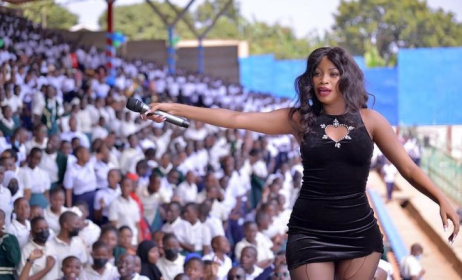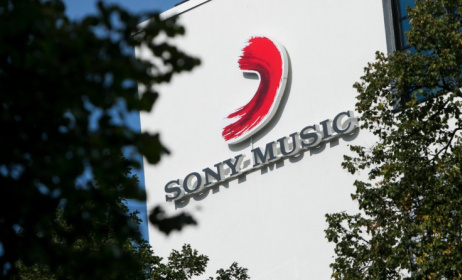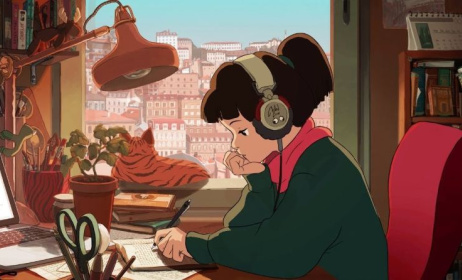Music education in South Africa
Music education in South Africa encompasses a broad range of disciplines, genres and cultural influences, reflecting an immense amount of diversity as a result of the country's mix of people groups and languages.
 School kids
School kids
Traditional African music exists alongside the music of immigrant cultures from around the world, much of which arrived as the result of South Africa's colonisation by Europeans from Holland, France and Britain, as well as from people groups who were brought into South Africa from Asia by the colonisers as labourers, from countries such as India, China and Malaysia. Before the arrival of Europeans on the continent, Southern Africa experienced an earlier wave of colonisation by the Bantu peoples, who migrated south from central and east Africa, and on arrival in Southern Africa encountered the earliest known inhabitants of the region, the hunter-gatherer Khoisan peoples.
As such, South Africa's contemporary music scene is one which has been shaped by great diversity, which is reflected today in its eclectic mix of musical styles and influences, and in the co-existence of both Western and indigenous knowledge systems and methodologies in music education at all levels of public and private, as well as formal and informal, education and training.
Music Education in South Africa: Background
As in other areas of life in South Africa, historical compartmentalisation of education according to race has left a legacy of inequality and division, the effects of which are still being felt today. Since the democratic transition of rule in 1994, discrimination on the basis of race, gender or any other difference has been outlawed, but due to the lingering effects of apartheid policies, South African society is now clearly split along economic lines. In educational terms, the result of this is that to a large extent, those living in areas considered formerly underprivileged still lack uniform access to quality education, at both primary and secondary level, while many living in areas formerly designated for whites enjoy access to private and former ‘Model C’ schools (a designation for formerly all-white government schools with a high degree of autonomy) which tend to offer superior teaching and learning facilities due to smaller class sizes and better funding.
Primary and secondary schools in South Africa fall under the Department of Basic Education. Most schools in the private education sector write the Independent Examinations Board (IEB) examinations and are members of the Independent Schools Association of South Africa (ISASA). While learners at IEB schools write the IEB's internally-set final examinations, they receive the same National Senior Certificate (NSC) on passing as government school learners. However, due to the exclusive nature of private schooling in South Africa, with most private schools being better resourced and having smaller class sizes than their government counterparts, the IEB certificate is perceived by many as being more challenging than its government counterpart, and therefore more desirable.
Schooling in both government and private schools runs from Grade R, a pre-primary year, to Grade 12, also colloquially known as matric. Within this structure there are two ‘bands’: General Education and Training (GET), which covers Grades R to 9; and Further Education and Training (FET), which covers Grades 10 to 12.
Music education is, on average, more developed and better-funded in South African private schools than in their government counterparts. IEB schools base their subject curricula on the Department of Basic Education’s Curriculum Assessment Policy Statements (CAPS) requirements, and then augment and extend their learning programmes as they see fit and as resources enable them to. Many private schools are able to offer not only the basic class music component required by the CAPS, but also employ specialist music teachers to give private music tuition to learners who wish to study an instrument either for extramural purposes or as a matric subject. Access to computers is widespread at private schools and some schools have started to offer basic training in some aspects of electronic music composition and production, incorporating the use of computer applications and tablet devices.
Many private schools have long traditions of musical excellence and provide opportunities for learners to participate in choirs, bands and ensembles of various sorts. In recent years, some South African private schools have started music centres that engage the services of itinerant music teachers who are paid directly by learners' parents. Some of the older single-sex government schools, such as Pretoria Boys High, King Edward VII School in Johannesburg and SACS in Cape Town, have also maintained long musical traditions and have choirs, pipe bands and jazz ensembles, as well as private music tuition on offer.
Due to the planning policies of the pre-1994 apartheid era, as well as the stark economic divisions which currently exist in South Africa, most private and former ‘Model C’ schools are still located in what have traditionally been – and still largely are – wealthy white areas; now, however, these areas are increasingly the preserve of any who can afford to live in them, regardless of race. Consequently, access to music education, like all other forms of education in South Africa, has in theory become more democratic. However, economic disparities mean that only the most basic musical education (in the form of the government schools' curriculum requirements up to the end of the Senior Phase) is really accessible to all income groups ¬- and even that varies in quality depending on the resources and challenges present in the different tiers of government schools.
Primary and Junior Secondary School
Within the General Education and Training band mentioned above, schooling is further divided into different phases. The GET band is split into three phases: Foundation Phase (Grade R – 3), Intermediate Phase (Grade 4 – 6) and Senior Phase (Grade 7 – 9). Secondary (high school) education begins from Grade 8, although it is technically a continuation of the Senior Phase.
The Department of Basic Education's Curriculum and Assessment Policy Statements (CAPS) for schools describe the parameters for teaching and learning in the subjects covered in the above-mentioned phases. Music is included alongside Drama, Art and Dance in the Life Skills curriculum for both Foundation and Intermediate Phases, and with the same disciplines in the Creative Arts curriculum of the Senior Phase.
According to the CAPS document for the Foundation Phase and Intermediate Phase, The main purpose of Creative Arts is to develop learners as creative, imaginative individuals, with an appreciation of the arts. It also provides basic knowledge and skills to be able to participate in creative activities.
In the Senior Phase, the CAPS description for the music section of the Creative Arts curriculum is as follows:
The study of music in Creative Arts aims to develop the ability to perform a variety of vocal and instrumental music in group and solo contexts. In addition, learners are exposed to the written and aural language of music through reading and writing music. Furthermore, the subject aims to develop the ability to create new music through improvising and composing, using both conventional and non-conventional compositional techniques. The content also enables learners to become informed listeners of music by actively listening to a variety of music ranging from Western, indigenous and popular music. If learners wish to study Music in the FET band, special effort should be made for them to develop the ability to perform instrumentally or vocally at an elementary level and have a good sense of rhythm and pitch. They should also be able to read staff notation at the end of Grade 9.
Senior Secondary School
In the Further Education and Training (FET) band of secondary school, which covers Grades 10 – 12, Music is not compulsory and is offered as a specialised matriculation subject. The FET CAPS document sets out the following aims music learners in Grades 10 to 12 to develop:
• technical control over one or more music instrument(s) or the voice;
• performance skills by way of performing a wide variety of musical works, in solo and group (ensemble) context, ranging from Western art music and jazz to indigenous African music (IAM);
• ability to read music notation(s);
• creativity through improvisation and working with own music ideas;
• understanding of existing works of music with regard to compositional techniques used, application of musical elements in existing musical works and placing these in a specific historical and cultural context;
• awareness of various musical traditions; and
• appreciation for various styles of music.
The instruments learners are allowed to learn at this stage are: keyboard instruments, voice, recorder, guitar, orchestral instruments, percussion (three instruments), band instruments, drum kit, indigenous African instruments, Indian instruments and steel pan. Topics in the subject at this level are broadly divided into the following categories: musical performance and improvisation; music literacy; and general music knowledge and analysis.
The curriculum for music study at this level is intensive and requires a high level of practical and theoretical development. Many private schools offer on-site music tuition for learners wishing to study music as a matric subject. For those doing music as a Matric subject who cannot get music tuition at their schools, there is the option of going to a private teacher who ensures that the learner fulfills the requirements for the subject and completes the necessary documentation required by the Department.
Extramural Music Centres
Besides formal music education at schools, there are a number of music centres in South Africa's major cities. Some of these centres are non-profit organisations and others are run privately. Pricing varies depending on the private or public status of the centre. The centres generally employ itinerant music teachers. These centres include the Beau Soleil, Hugo Lambrechts and Frank Pietersen Music Centres in Cape Town and the Music Academy of Gauteng in Johannesburg.
Music Education at Tertiary Level
Music-related qualifications at undergraduate and/or postgraduate level are offered at the most South African universities, including theUniversity of South Africa (UNISA), University of Cape Town (UCT), University of the Witwatersrand (WITS) in Johannesburg, Tshwane University of Technology (TUT), the University of KwaZulu-Natal (UKZN) in Durban and Nelson Mandela Metropolitan University (NMMU) in Port Elizabeth. These institutions offer a wide variety of music-related qualifications, from theory and performance to arts management and administration, sound engineering, music therapy, conducting, community training, archiving and ethnomusicology.
Private Music Tuition and Colleges
Private music tuition is available in all of South Africa's major cities and also in many of its smaller towns. This takes place either in the form of one-on-one or small group tuition in the teacher's private home, or at a dedicated private music school, most of which are run in the afternoons and on weekends. An emerging trend is the development of music tuition offered on the premises of musical instrument retailers, such as Paul Bothner Music, The Music Connection, Marshall Music, Music Mate and Matt's Music.
The pricing of lessons in the private sector varies depending on the teacher or institution and, as with many other private educational services, there is no regulation of pricing. As such, individual private music tuition has not been widely available to the disadvantaged sectors of South African society as academic education has of necessity traditionally been given financial priority over other activities. The growth of development initiatives in previously disadvantaged communities has helped to begin to address this issue in many parts of the country.
There are a number of private tertiary institutions in South Africa specialising in music performance, production and marketing. One of the most prominent of these is the Campus of the Performing Arts (COPA), which has four branches ¬- in Johannesburg, Pretoria, Cape Town and Durban. Each campus is split into schools of music performance, music production and music business. Part time courses are also available. All local COPA courses are found on the South African Qualification Authority (SAQA) National Qualifications Framework (NQF). COPA has also entered into a franchise agreement with UK-based institution the Academy of Contemporary Music (ACM), and offers internationally accredited ACM courses.
Other reputable private colleges include the SAE Institute in Cape Town, part of a global network of SAE colleges providing "creative media education"; the Academy of Sound Engineering based at the South African Broadcasting Corporation (SABC) Radio Park in Auckland Park, Johannesburg; City Varsity, which has campuses in Johannesburg and Cape Town and offers courses in various creative fields, including sound engineering; and Emendy Sound & Music Technologies in Pretoria, which offers accredited full and short courses in Music Technology, including sound engineering and digital music production.
Music Educators' Associations
All teachers working on a full-time employee basis in South African schools, including music teachers, are required to be registered with the South African Council of Educators (SACE). However, there are many itinerant music teachers working in schools who are not SACE-registered, as they work at the schools in their private capacities.
The South African Society of Music Teachers (SASMT) is a voluntary membership, non-profit organisation founded in Cape Town in 1918, and represents local music teachers in all spheres and levels of education. The SASMT website provides a national database of registered music teachers, as well as information of interest to those in the music education arena.
Music Development Initiatives
Young South Africans who want to study music can also rely on a variety of development initiatives run by non-profit organisations that use music to train, empower and uplift those from poor communities. Some of the music development initiatives active in South Africa include: MIAGI (Music Is A Great Investment), which trains young classical, jazz and indigenous music performers and arranges music events, workshops and international tours; Buskaid, which runs a music school in Diepkloof, Soweto; the Johannesburg Youth Orchestra Company, which runs orchestral music tuition and ensemble groups for schoolkids in Johannesburg and surrounding townships, as well as teacher training and mentorship programmes; the Hout Bay Music Project outside Cape Town and the Music van de Caab at the Solms-Delta wine farm in the Franschoek area of the Western Cape.
For all musicians of school-going age, the National Eisteddfod Academy (NEA), established in 1997, holds an annual national round of events in performance disciplines including music, speech and drama and dance, during which the top candidates in each discipline progress from local rounds to a national competition. In its music section, the Eisteddfod includes choral, indigenous, classical, crossover, stage and contemporary music. The NEA also has a social development initiative known as the Di Konokono Arts and Culture Festival, which offers participants from previously disadvantaged communities the opportunity to perform in a national festival of the performing arts.
Article by Doug Rodger.
Disclaimer: Music In Africa's Overviews provide broad information about the music scenes in African countries. Music In Africa understands that the information in some of these texts could become outdated with time. If you would like to provide updated information or corrections to any of our Overview texts, please contact us at info@musicinafrica.net.






























Comments
Log in or register to post comments